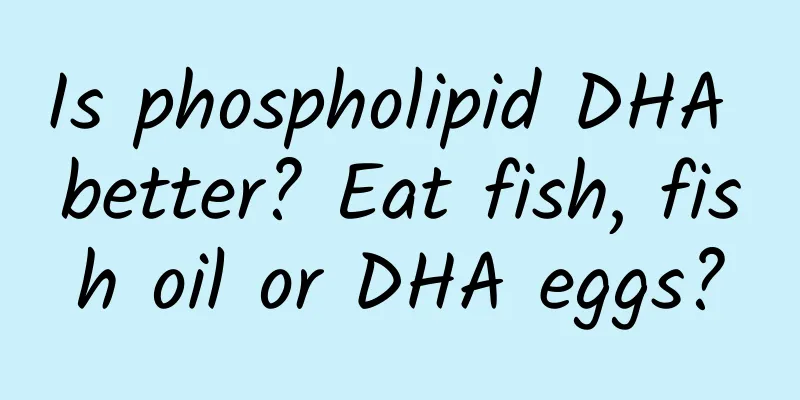Is phospholipid DHA better? Eat fish, fish oil or DHA eggs?

|
I've been getting a lot of questions lately about fish, fish oil, omega-3 fatty acids, and DHA. Netizen A asked: I bought fish oil for my parents during the Chinese New Year, and they asked me: What is the use of taking fish oil? Actually, I can't explain it clearly - is it to supplement VD, calcium, protect blood vessels, or supplement DHA? Netizen B asked: Fish oil has been very popular recently. I want to supplement DHA for my baby. Is it better to eat fish, fish oil or algae oil? Netizen C asked: I want to increase the DHA supply for the pregnant woman in my family. I did some careful research and found that there are triglyceride DHA, ethyl ester DHA, and phospholipid DHA on the market; there are fish oil, algae oil, and DHA eggs. It is too complicated and I don’t know which one is better. Here I will briefly tell you about the knowledge about DHA. Where can I get DHA? DHA is a long-chain polyunsaturated fatty acid of the omega-3 series and is the most important fatty acid in the human brain and nervous system. It is needed for the development of fetuses and infants, to prevent eye aging, and to prevent cognitive decline in the elderly. There are two ways to get DHA. One is to eat DHA directly from food or supplements, and the other is to eat alpha-linolenic acid, or ALA, and then convert it into DHA in the human body. However, this conversion efficiency is relatively low, only about 3% for omnivores. Therefore, pregnant women, breastfeeding mothers and infants who are in urgent need of DHA are best to get some DHA directly from food or supplements . Foods containing DHA mainly include marine fish and shrimp, carnivorous freshwater fish, and specially produced high-DHA eggs. If you want to supplement omega-3 fatty acids, you don't have to eat expensive marine fish. Some cheap marine fish and carnivorous river fish are also good sources of DHA and EPA. For example, the fat of common marine fish such as saury, hairtail, small yellow croaker, and river fish such as seabass, mandarin fish, catfish, eel, eel, black fish, and yellow catfish all contain a lot of DHA; but the content of herbivorous fish such as tilapia, basa fish, grass carp, and bighead carp is relatively low. It must be pointed out here that the fat of marine fish is not all DHA, but also contains a lot of saturated fatty acids . The DHA content is only about 5% to 14%, and the content of each type of marine fish is different. The DHA of marine fish is not synthesized by themselves, but comes from the seaweed they eat. Marine fish will store the DHA of seaweed in their bodies. What are the three types of DHA? In the current foods and supplements containing DHA, DHA exists in three forms: triglyceride DHA (TAG-DHA), ethyl ester DHA (EE-DHA), and phospholipid DHA (PL-DHA) . DHA in natural fish oil mainly exists in the form of triglycerides. In the subsequent treatment to increase the DHA content, a portion of triglyceride DHA (TAG-DHA) will be converted into ethyl ester DHA (EE-DHA), so most commercially available fish oils are ethyl ester DHA. As mentioned earlier, algae oil DHA is separated and extracted after fermentation of single-cell seaweed. It is mainly triglyceride DHA, but also contains some ethyl ester DHA. Its overall bioavailability, antioxidant activity and DHA content are higher than those of fish oil. There is also a type of DHA called "rTG", which is also TG in nature, and is also a triglyceride type. It is just that through the transesterification technology, the ethyl ester type (EE-DHA) that is converted during processing is changed back to a triglyceride type (TG-DHA). Phospholipid DHA (including phosphatidylcholine and phosphatidylethanolamine) is mainly found in foods such as fish eggs, krill oil, and phospholipid DHA eggs. However, since there are not enough human experimental studies, more research evidence is needed to determine whether the long-term biological effects of phospholipid DHA in the human body are significantly better than those of triglyceride DHA. Are lecithin and phospholipid-type DHA the same thing? Some netizens asked this question, so I would like to explain it here: lecithin ≠ phospholipid-type DHA . Two fatty acid molecules are bound to one lecithin molecule, which may or may not contain DHA. Egg yolks are the best source of lecithin, followed by soybeans. When soybean oil is processed, soybean lecithin is separated from the oil, so soybean lecithin is the cheapest and most abundant lecithin product on the market. However, soybean lecithin contains almost no DHA. The phospholipids in egg yolks all contain DHA, but the specific content varies greatly and is closely related to the content of the chicken feed. Only when sufficient DHA or its precursor is supplied from the chicken feed can the DHA content in the phospholipids of egg yolks be increased, otherwise the content is very low. Simply put, if you feed fish meal and fish oil to chickens, they will store DHA in the egg yolk just like marine fish . If the hens themselves cannot eat DHA, and do not even have the raw materials for making DHA, such as flax seeds, then they will not be able to store DHA in the eggs. Besides DHA, what else can you supplement with fish oil? Fish oil is the fat of fish. As mentioned above, it contains a variety of fatty acids, the largest proportion of which is saturated fatty acids. The difference between it and the fat of land animals is that it contains a few to more than ten percent of omega-3 fatty acids such as EPA and DHA. The question is which omega-3 fatty acid you need to supplement. DHA and EPA have different health benefits . If it is for infants and pregnant women , the main purpose is to obtain DHA. So when buying fish oil, you must open your eyes and see the omega-3 fatty acid content, and make sure that most of the omega-3 fatty acids are DHA. Because supplementing EPA is meaningless for infants and pregnant women, and even too much may be harmful. Supplementing saturated fatty acids is also meaningless. If you buy it for the elderly , you also have to figure out what they want. DHA is needed to protect the eyes and delay cognitive aging. But EPA may be more needed to reduce inflammatory response, control blood lipids, and prevent ischemic cardiovascular and cerebrovascular diseases. But on the other hand, if there is a risk of vascular rupture and bleeding, then supplementing EPA is not appropriate. Therefore, it is best to consult a cardiovascular doctor and a clinical nutritionist to understand whether fish oil supplements are suitable for you and your family, rather than buying them blindly. It must be said here that the research evidence is inconsistent as to whether fish oil can effectively reduce the mortality of cardiovascular and cerebrovascular diseases. Some studies believe that there is no significant effect . Recent studies have reported that excessive intake of fish oil may increase the risk of atrial fibrillation, and long-term fish oil supplementation may increase the risk of depression. Some people also have other adverse reactions to fish oil. Finally, fish oil cannot supplement calcium, nor can it effectively supplement vitamin A and vitamin D. Only cod liver oil can supplement vitamin A and vitamin D. The content in fish oil is much lower than that in cod liver oil, just like the content of vitamin A and D in lard is much lower than that in pig liver. The specific content depends on the measured data. Whole food or supplements? Compared with taking DHA supplements directly, many nutritionists prefer to eat foods rich in DHA directly. For example, eating non-fried marine fish/carnivorous river fish directly, or eating eggs rich in phospholipid DHA is also good. Because getting DHA from food not only gets DHA itself, but also gets the protein, multiple vitamin components and multiple trace elements in it. Studies have shown that eating fish regularly during pregnancy, nursing mothers and infants can improve cognitive development in early life. Eating eggs has also been shown to be beneficial for cognitive development in infants in developing countries. However, no studies have proven that eating fish or eggs alone can achieve the same effect. A netizen asked: There is DHA in marine fish, but is it also polluted? Should we eat it? Indeed, although fish and other aquatic products are the source of omega-3 fatty acids, they are also one of the important ways for heavy metal pollutants to enter the human body. Eating a lot of fish and other aquatic products will also bring potential health risks. For marine fish, mercury pollution is the most noteworthy type of heavy metal pollution. In addition, environmental pollutants such as polychlorinated biphenyls and dioxins also have a strong ability to accumulate in aquatic animals. Since the country has relevant tests and inspections, as long as you choose marine fish sold through regular channels, you don't have to worry about radioactive contamination and excessive heavy metals. From the perspective of avoiding heavy metals and pollution risks, you can eat 300-500 grams of pure fish meat 2-3 times a week. Eating fish in moderation can provide nutrition and avoid risks. When choosing products such as fish oil, you should also pay attention to whether heavy metal impurities are removed as much as possible during the production process. Some netizens also asked: High-DHA eggs contain DHA, but do they also contain cholesterol? If eggs are cholesterol-free, you can eat them without worry. In fact, all animal foods, including pork, chicken, beef, fish, shrimp, crab and shellfish, contain cholesterol. Why should we demand that eggs have zero cholesterol? There are cholesterol-lowering eggs on the market, which can reduce cholesterol content to 2/3 to 1/2 of the average, making us feel much more at ease when eating. However, it is impossible to have zero cholesterol in poultry eggs. Not only chicken eggs, but also duck eggs, goose eggs, quail eggs, and pigeon eggs are impossible. Cholesterol is a component required by every cell and an important component of the brain and nervous system. It is impossible for animals to have no cholesterol . On average, one egg yolk contains more than 200 mg of cholesterol, which is equivalent to 2 taels of abalone/clams/river crabs; while 2 taels of boneless chicken, 2 taels of shrimp or 2 taels of crucian carp also contain more than 100 mg of cholesterol. There are only two ways to eat cholesterol-free foods: one is to eat pure plant-based foods, as plants do not synthesize cholesterol; the other is to eat fat-free foods, as cholesterol is a fat-soluble substance and is always present with fat. In short, improving the nutritional quality of food and ensuring the balance of nutrients is always the first choice for a healthy diet. Eating food of poor quality and taking supplements at the same time is only an emergency option, but not a long-term solution. When a deficiency is found or there are specific health problems, taking supplements in the short term and improving the quality of diet at the same time is the wisest choice. References: 1 Wang Xiaodi, Gao Wenhao, Ren Haowei, et al. Digestion, absorption and transport of phospholipid DHA. Journal of Chinese Institute of Food Science and Technology, 2023, 23(5): 387-399. 2 Chen Guangqi, Jia Min, Zong Aizhen, et al. Research progress on preparation, detection and nutritional characteristics of phospholipid DHA. China Oils and Fats, 2023-11-21 Online first release 3 Liu Shuyuan, Guo Mingzhu, Ma Aijin, et al. Research progress on n-3 PUFA enrichment, stabilization technology and bioactivity of fish oil. Journal of Chinese Institute of Food Science and Technology, first published online on 2024-01-11 4 Gao Yixiong, Zhang Hongxia, Hu Yuming, et al. Study on fatty acid content of freshwater fish in Dongting Lake. Chinese Journal of Food Hygiene. 2015,27(01): 6-9. 5 Nutrient and pollutant content of farmed fish and its risk-benefit assessment on human health. Master's thesis of East China Normal University, 2010. 6 Zhang Qiufang, Wang Ziyi, Shen Xiaofang. Research progress of DHA-fortified eggs. China Oils and Fats, 2023, 48(1): 98-103. 7 Li Jufen. Effects of dietary fish oil supplementation on fatty acid enrichment and metabolite composition of egg yolk in laying hen. Master's thesis of Yunnan Agricultural University, 2023. 8 Li Zimu, Zong Lei, Bi Yanlan. Comparative analysis of lipid composition of DHA-fortified eggs and ordinary eggs yolk. Chinese Journal of Oils and Fats, 2021, 46(2): 36-40 In animals, the DHA content in phospholipids is much higher than that in subcutaneous fat (triglycerides). In fact, DHA in the human brain mainly exists in the form of phospholipid DHA. Since phospholipids themselves are precursors of neurotransmitters and help improve learning and memory abilities, phospholipid DHA has also received more attention. It has more advantages than triglyceride and ethyl ester DHA in terms of digestion, absorption and brain uptake. Studies have shown that the absorption rate of ethyl ester DHA is 21%, triglyceride DHA is 54%, and phospholipid DHA is 99% . For infants and young children with weak digestion and absorption ability, phospholipid DHA is obviously more advantageous. Studies conducted in premature infants have also found that formula milk fortified with phospholipid DHA has a better DHA absorption and utilization rate. At the same time, phospholipid DHA has a higher antioxidant capacity . Since DHA is a highly unsaturated fatty acid, it is very susceptible to oxidation. However, DHA in the sn-2 position of the phospholipid structure is more stable and less likely to be oxidized during digestion and absorption. Therefore, it is almost the best source of DHA available to humans. Animal experiments have found that in addition to supporting the development and health of the nervous system, phospholipid DHA may also have some special health functions, such as inducing tumor cell apoptosis, improving glucose and lipid metabolism disorders, and anti-inflammatory effects. |
<<: Chasing wind and lightning, he makes data storage more reliable!
Recommend
Why are 1 to 0 read as “一两三四五六拐怕勾洞”?
When watching war movies, you must have heard the...
In the hot summer, there is an "otter" that is super sweet! Do otters have their own "bubble effects" when swimming in the water?
The temperature in Nanjing has soared to over 30 ...
What is the exposure mechanism of information flow advertising?
When doing information flow advertising, you may ...
Is listening to music to maintain health reliable? Let's take you into the wonderful "music therapy"
Author: Sun Zhenghai Qiqihar Medical College Scho...
How much does it cost to develop a Mianyang movie mini program? Mianyang movie applet development price inquiry
How much does it cost to join the movie mini prog...
A brief analysis of the principles of mobile rendering
Author| Shang Huaijun Rendering on a computer or ...
Even Sony's Takeshi Soeda doesn't dare to easily say that it's going smoothly. How can PS VR open up a new path in China?
The news of PS VR landing in China has become a h...
Does clean energy have bugs? Too much can’t be stored! Technology coupling may be “fixed”
In September, the "International Forum on Ca...
The iPhone is getting bigger and the iPad is dying
IDC released a report saying that it expects globa...
GSMA: 50% of Chinese consumers hope to buy 5G mobile phones as soon as possible
Smartphones will remain the dominant consumer dev...
Tencent Social Advertising Getting Started Guide
Recently, many of my friends who have transformed...
2022 Chengdu Tea Tasting Studio Contact Guide
Chengdu Tea Tasting Studio has its own appointmen...
In-depth analysis of banner, interstitial, and interactive advertising performance
Today, Qingguajun will explain banners, interstit...
How to motivate users? 4 aspects!
This article combines some of the user operations...









